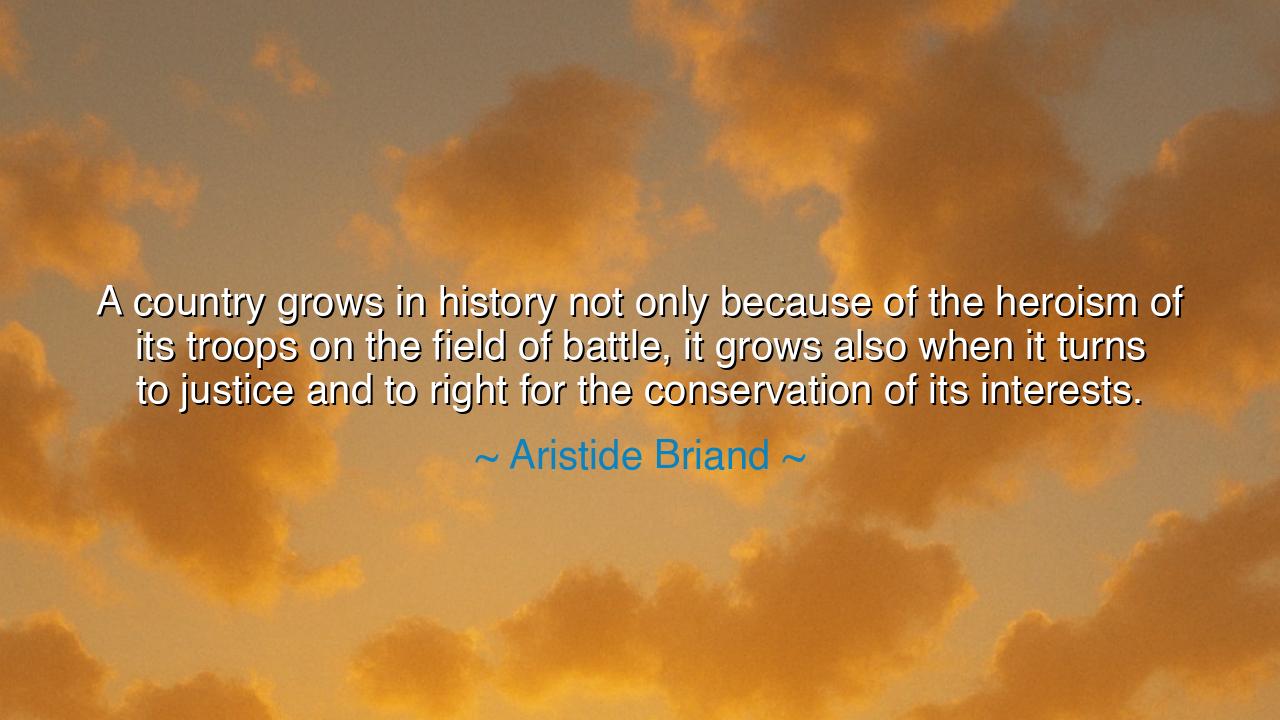
A country grows in history not only because of the heroism of its
A country grows in history not only because of the heroism of its troops on the field of battle, it grows also when it turns to justice and to right for the conservation of its interests.






When Aristide Briand declared, “A country grows in history not only because of the heroism of its troops on the field of battle, it grows also when it turns to justice and to right for the conservation of its interests,” he spoke as one who had seen the fires of war and the fragile dawn of peace. His words are not those of a conqueror, but of a peacemaker, one who understood that true greatness is not measured in the blood spilled on the battlefield, but in the wisdom and virtue with which a nation governs its heart. Briand’s voice rose from the ashes of Europe after the First World War — an age that had worshipped might and found ruin. From that devastation he drew a timeless truth: that power without justice is destruction, but justice, guided by moral strength, is the foundation of enduring civilization.
Briand was a French statesman, a man who lived through the fury of two world wars and sought to heal the wounds they left behind. His life’s work was not in conquest, but in reconciliation — most notably through the Kellogg–Briand Pact of 1928, a treaty that sought to renounce war as an instrument of policy. Though history would later see that dream tested and broken, the spirit behind it remains immortal. When he spoke these words, he was reminding his nation — and all nations — that greatness cannot be sustained by the sword alone. The valor of soldiers wins battles, but the justice of leaders wins peace, and it is peace, not war, that allows a people to build monuments of culture, learning, and prosperity.
To say that “a country grows in history” is to say that it matures in soul. Every nation, like every man, begins in struggle — forged by conflict and defended by courage. But if it does not rise beyond the cry of arms, it remains forever a child, bound to its fears. Briand saw in justice the next step of evolution — the mark of a people who have learned that to preserve what is noble, one must act with righteousness, not revenge. For justice is not weakness; it is strength tempered by wisdom. It is the courage to choose peace when hatred burns, to act with restraint when power tempts, and to seek fairness even when the heart demands retribution.
History bears witness to this truth. Consider Emperor Ashoka of India, who, after his bloody conquest of Kalinga, looked upon the carnage he had wrought and felt the weight of remorse. He turned from war to the Dharma, to rule by virtue rather than violence. Under his reign, India flourished — not through domination, but through compassion, tolerance, and the spread of knowledge. Ashoka’s transformation mirrors the ideal Briand describes: that the highest victory of a nation is not over its enemies, but over its own capacity for cruelty. Just as the warrior learns, in time, that discipline is greater than rage, so too must a nation learn that justice is the truest defense of its interests.
Briand’s words also hold a warning for those who mistake strength for savagery. Many empires have risen through war — Rome, Napoleon’s France, even the colonial powers of his own time — but each in turn was brought low by its inability to balance might with morality. The sword carves swiftly, but it cannot plant roots. Only when a people turns to justice — to law, diplomacy, and respect for human dignity — can their legacy endure beyond the generation of conquest. The growth of a country in history is therefore not the swelling of its borders, but the deepening of its conscience.
There is a spiritual grandeur in this vision. Briand’s understanding of history was not mechanical, but moral. He saw nations not as machines of economy or armies, but as living souls, whose destinies depend on the harmony between power and principle. When a country fights for right rather than dominance, when it treats even its rivals with fairness, it writes its name not merely in chronicles, but in the moral memory of humanity. That is the growth he speaks of — the transformation of power into virtue, and ambition into wisdom.
So let us take his lesson as our own: heroism on the battlefield may defend a nation’s body, but justice nourishes its soul. In our own time, when conflicts still arise and pride still blinds, we must remember that true patriotism is not hatred of the other, but devotion to truth. Every citizen, like every leader, has a duty to guard not only the borders of their homeland, but the integrity of its heart.
And thus, O listener, remember: the greatness of a country is not measured in its victories, but in its virtue. A nation that stands for justice will outlast the monuments of conquest; its legacy will be peace, its power eternal. For when the drum of war is silent and the fields are still, it is justice — not glory — that carries a people forward into history’s light.






AAdministratorAdministrator
Welcome, honored guests. Please leave a comment, we will respond soon